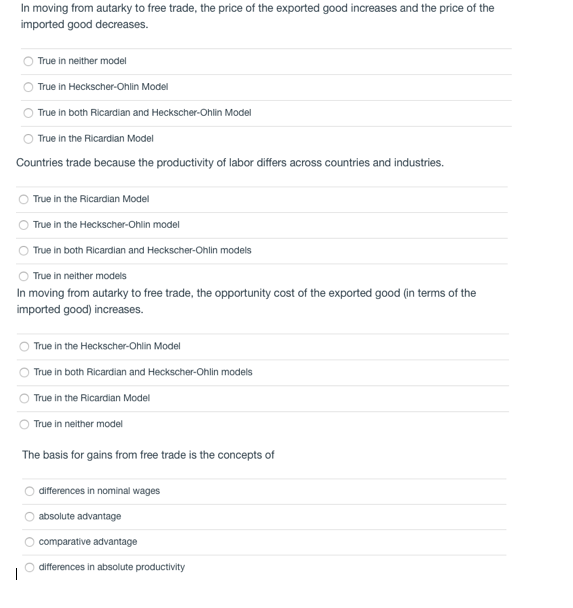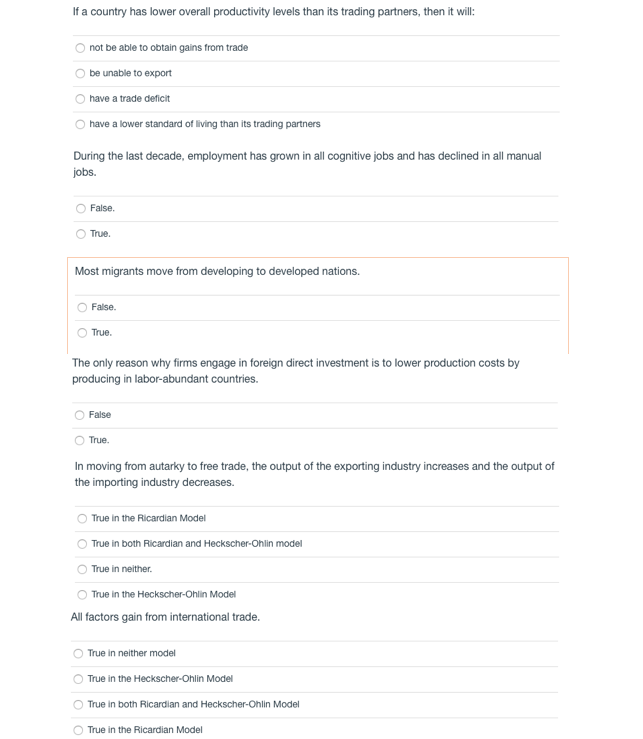In moving from autarky to free trade, the price of the exported good increases and the price of the imported good decreases. True in neither model True in Heckscher-Ohlin Model True in both Ricardian and Heckscher-Ohlin Model O True in the Ricardian Model Countries trade because the productivity of labor differs across countries and industries. True in the Ricardian Model True in the Heckscher-Ohlin model True in both Ricardian and Heckscher-Ohlin models O True in neither models In moving from autarky to free trade, the opportunity cost of the exported good (in terms of the imported good) increases. True in the Heckscher-Ohlin Model True in both Ricardian and Heckscher-Ohlin models True in the Ricardian Model True in neither model
In moving from autarky to free trade, the price of the exported good increases and the price of the imported good decreases. True in neither model True in Heckscher-Ohlin Model True in both Ricardian and Heckscher-Ohlin Model O True in the Ricardian Model Countries trade because the productivity of labor differs across countries and industries. True in the Ricardian Model True in the Heckscher-Ohlin model True in both Ricardian and Heckscher-Ohlin models O True in neither models In moving from autarky to free trade, the opportunity cost of the exported good (in terms of the imported good) increases. True in the Heckscher-Ohlin Model True in both Ricardian and Heckscher-Ohlin models True in the Ricardian Model True in neither model
Principles of Economics 2e
2nd Edition
ISBN:9781947172364
Author:Steven A. Greenlaw; David Shapiro
Publisher:Steven A. Greenlaw; David Shapiro
Chapter23: The International Trade And Capital Flows
Section: Chapter Questions
Problem 45P: Table 23.7 provides some hypothetical data on macroeconomic accounts for three countries represented...
Related questions
Question

Transcribed Image Text:In moving from autarky to free trade, the price of the exported good increases and the price of the
imported good decreases.
True in neither model
True in Heckscher-Ohlin Model
True in both Ricardian and Heckscher-Ohlin Model
True in the Ricardian Model
Countries trade because the productivity of labor differs across countries and industries.
True in the Ricardian Model
True in the Heckscher-Ohlin model
True in both Ricardlan and Heckscher-Ohlilin models
O True in neither models
In moving from autarky to free trade, the opportunity cost of the exported good (in terms of the
imported good) increases.
True in the Heckscher-Ohlin Model
True in both Ricardian and Heckscher-Ohlin models
True in the Ricardian Model
O True in neither model
The basis for gains from free trade is the concepts of
differences in nominal wages
absolute advantage
O comparative advantage
differences in absolute productivity
O O

Transcribed Image Text:If a country has lower overall productivity levels than its trading partners, then it will:
not be able to obtain gains from trade
be unable to export
have a trade deficit
have a lower standard of living than its trading partners
During the last decade, employment has grown in all cognitive jobs and has declined in all manual
jobs.
False.
True.
Most migrants move from developing to developed nations.
False.
True.
The only reason why firms engage in foreign direct investment is to lower production costs by
producing in labor-abundant countries.
False
True.
In moving from autarky to free trade, the output of the exporting industry increases and the output of
the importing industry decreases.
True in the Ricardian Model
True in both Ricardian and Heckscher-Ohlin model
True in neither.
True in the Heckscher-Ohlin Model
All factors gain from international trade.
True in neither model
True in the Heckscher-Ohlin Model
True in both Ricardian and Heckscher-Ohlin Model
True in the Ricardian Model
Expert Solution
This question has been solved!
Explore an expertly crafted, step-by-step solution for a thorough understanding of key concepts.
This is a popular solution!
Trending now
This is a popular solution!
Step by step
Solved in 2 steps

Knowledge Booster
Learn more about
Need a deep-dive on the concept behind this application? Look no further. Learn more about this topic, economics and related others by exploring similar questions and additional content below.Recommended textbooks for you

Principles of Economics 2e
Economics
ISBN:
9781947172364
Author:
Steven A. Greenlaw; David Shapiro
Publisher:
OpenStax


Economics: Private and Public Choice (MindTap Cou…
Economics
ISBN:
9781305506725
Author:
James D. Gwartney, Richard L. Stroup, Russell S. Sobel, David A. Macpherson
Publisher:
Cengage Learning

Principles of Economics 2e
Economics
ISBN:
9781947172364
Author:
Steven A. Greenlaw; David Shapiro
Publisher:
OpenStax


Economics: Private and Public Choice (MindTap Cou…
Economics
ISBN:
9781305506725
Author:
James D. Gwartney, Richard L. Stroup, Russell S. Sobel, David A. Macpherson
Publisher:
Cengage Learning

Macroeconomics: Private and Public Choice (MindTa…
Economics
ISBN:
9781305506756
Author:
James D. Gwartney, Richard L. Stroup, Russell S. Sobel, David A. Macpherson
Publisher:
Cengage Learning

